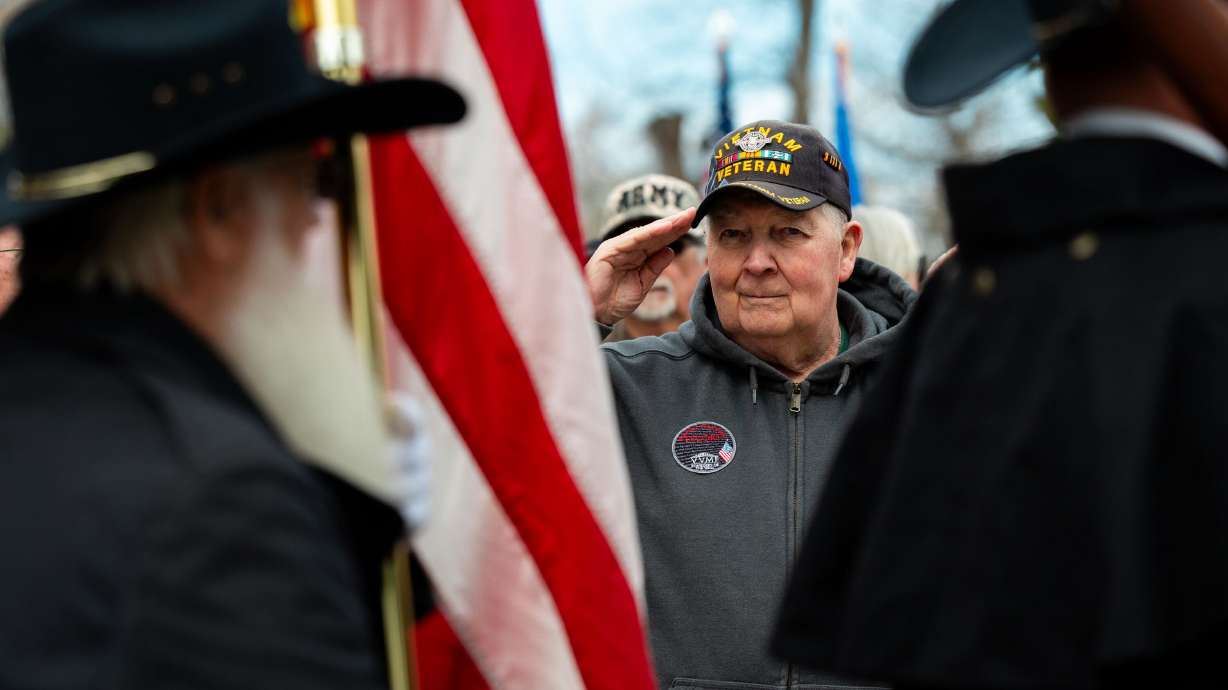Estimated read time: 3-4 minutes
- Utah ranks 29th for support of military retirees.
- Utah lags in quality of life and health care, according to WalletHub's study.
- South Carolina tops the list for offering overall best support of military retirees.
SALT LAKE CITY — May is National Military Appreciation Month — so it's an apt time to ask: Is Utah a "vet friendly" state for military retirees?
Sort of — when compared with other states and the District of Columbia.
The Beehive State ranks about in the middle of the country in its ability to provide a comfortable military retirement, according to a study released by WalletHub.
Utah is ranked No. 29 in the study — scoring a high mark in the "Economic Environment" rankings category, but much lower in "Quality of Life" and "Health Care" rankings.
The top five states for American military retirees, according to WalletHub, are South Carolina, Maryland, New Hampshire, North Dakota and Virginia.
The bottom five? The District of Columbia, New Jersey, Vermont, Washington and Oregon.
"Transitioning from military to civilian life isn't easy, but the best states for military retirees make that adjustment as smooth as possible," said WalletHub analyst Chip Lupo.
"In addition to providing the conditions necessary for our veterans to thrive financially, they also have ample resources for taking care of military retirees' physical and mental health."
The study notes that many American men and women who wore their country's uniform face major struggles, "including post-traumatic stress disorder, disability and homelessness, which are especially difficult to deal with during this period of economic difficulty."
Veterans also must consider how state policies on military benefits vary, along with the "relative friendliness of different job markets and other socioeconomic factors," when deciding where to live following military retirement.
Is Utah a veteran-friendly state?
WalletHub compared Utah with other states' abilities to provide a comfortable military retirement by analyzing a data set of 28 key metrics, ranging from the number of veterans per capita to the number of Veterans Affairs health facilities to job opportunities for veterans.
Analysts measured three key dimensions: first, economic environment; second, quality of life; and third, health care.
The "economic environment" dimension included several economic metrics such as how the state taxes military pensions, the share of veteran-owned businesses, job opportunities for veterans, the number of military bases, housing affordability and academic credit opportunities offered to veterans.
Given the state's strong overall economy, it's little surprise Utah was listed as fourth in the nation in that dynamic.
Utah didn't fare nearly as well in the "quality of life" and "health care" rankings — scoring 31st and 47th, respectively.
The "quality of life" metrics include a state's share of veterans, share of VA benefits-administration facilities per number of veterans, share of homeless veterans and idealness of weather.
The "health care" metrics include the number of Veterans Affairs health facilities per number of veterans, quality of Veterans Affairs hospitals, veteran suicide rates, and physicians and mental health counselors per capita.
South Carolina secured the study's "Best State for Military Retirees" top spot because of its many veteran-friendly policies.
"The state allows businesses to give preferential hiring to veterans, offers academic credit for military service, and has veteran treatment courts, which give services like treatment and mentoring to veterans in the criminal justice system," according to WalletHub.
"South Carolina doesn't tax military pensions, either."
Maryland, meanwhile, finished just behind South Carolina in the rankings, in part because it offers extensive health care options and has a large number of Veterans Affairs Benefits Administration facilities per capita, ensuring veterans receive support.
Maryland also allows employers to give preference to veterans when hiring and has veteran treatment courts.
What other key findings does the military retirees study reveal?
Despite the presence of large military facilities such as Hill Air Force Base and Camp Williams, Utah still has a comparatively small number of veterans per capita — ranked 48th.
Alaska, Montana, Virginia, Wyoming and Maine have the nation's highest concentrations of veterans.
For housing affordability, Iowa and Kansas offer veterans the best opportunities. Hawaii and California are at the bottom of the list.
But Kansas offers the fewest job opportunities for veterans, according to WalletHub. New Hampshire and Alabama top the "job opportunities" tally.
Meanwhile, based on how states voted in the 2024 presidential election, red states are more friendly toward military retirees than blue states.










